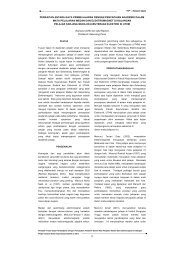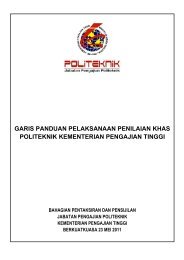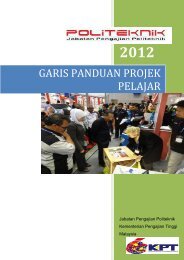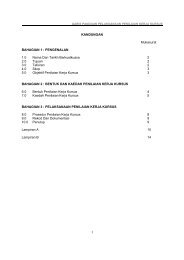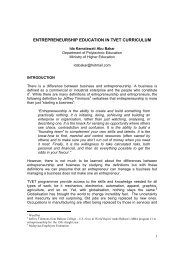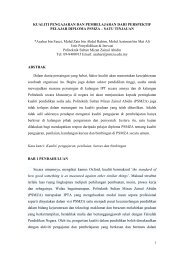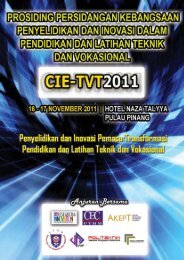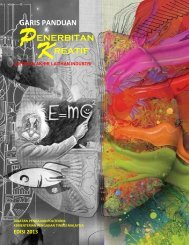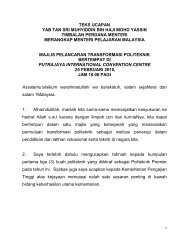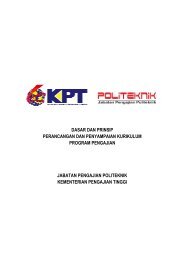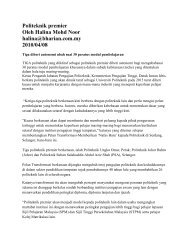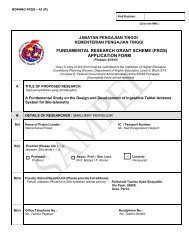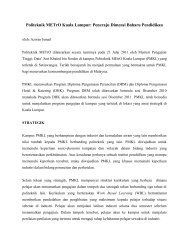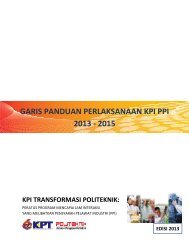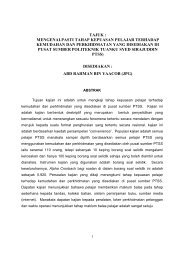generic skills in personel development - Jabatan Pengajian Politeknik
generic skills in personel development - Jabatan Pengajian Politeknik
generic skills in personel development - Jabatan Pengajian Politeknik
You also want an ePaper? Increase the reach of your titles
YUMPU automatically turns print PDFs into web optimized ePapers that Google loves.
GENERIC SKILLS IN PERSONNEL DEVELOPMENT<br />
Saifudd<strong>in</strong> Kumar Abdullah M. Ed<br />
Department of Polytechnic<br />
Kementerian <strong>Pengajian</strong> T<strong>in</strong>ggi Malaysia<br />
sa<strong>in</strong>ash6565@hotmail.com<br />
ABSTRACT<br />
The global challenge nowadays mak<strong>in</strong>g the competition for a job is particularly<br />
high. Any organizations need all-round candidates that can br<strong>in</strong>g the company<br />
ahead of others. Graduates with high <strong>generic</strong> <strong>skills</strong> are the most preferable for<br />
tak<strong>in</strong>g on a job. Generic <strong>skills</strong> are also known as <strong>skills</strong>, qualities and trait that an<br />
<strong>in</strong>dividual has to master <strong>in</strong> order to succeed <strong>in</strong> their studies and career. This<br />
quality def<strong>in</strong>ed as also team-work, time management, problem solv<strong>in</strong>g, and<br />
sharpen numerical <strong>skills</strong>. The focus of this paper is to discuss the challenges<br />
faced and the strategies to overcome the problems faced <strong>in</strong> personnel<br />
<strong>development</strong><br />
INTRODUCTION<br />
1
‘To place the right people with the right <strong>skills</strong> <strong>in</strong> the right jobs for the<br />
right cost at the right time....’<br />
Tuan Hj Abbas B<strong>in</strong> Hj Awang<br />
The phrase above reflects the concern of employers today. Basis of<br />
recruitment for prospective employees will be on the <strong>skills</strong> that they possess<br />
besides their academic qualifications. At a glance reveals that employers look for<br />
well-rounded people with a variety of <strong>generic</strong> <strong>skills</strong>; people who can learn<br />
<strong>in</strong>dependently and have a desire to keep <strong>in</strong>creas<strong>in</strong>g their knowledge and abilities<br />
throughout life. They want people capable of both critical thought and creativity.<br />
In this paper, we will look at what <strong>generic</strong> <strong>skills</strong> are and the importance of<br />
<strong>generic</strong> <strong>skills</strong> <strong>in</strong> personnel <strong>development</strong>. We shall also be look<strong>in</strong>g at the<br />
challenges faced <strong>in</strong> personnel management and describe the strategies to<br />
overcome the challenges based on <strong>generic</strong> <strong>skills</strong>.<br />
GENERIC SKILLS<br />
Generic <strong>skills</strong> are also known as <strong>skills</strong>, qualities and trait that an <strong>in</strong>dividual<br />
has to master <strong>in</strong> order to succeed <strong>in</strong> their studies and career. They are <strong>skills</strong>,<br />
other than their technical <strong>skills</strong> required for their jobs and cannot e developed<br />
overnight. Rather these <strong>skills</strong> are someth<strong>in</strong>g that an <strong>in</strong>dividual picks up time and<br />
experience.<br />
Generic <strong>skills</strong> are also known by other names overseas (FIGURE 1).<br />
Employees with a variety of <strong>generic</strong> <strong>skills</strong> will be competent <strong>in</strong> their work and thus<br />
highly value by their employers. The Australian Chamber of Commerce def<strong>in</strong>es<br />
<strong>generic</strong> <strong>skills</strong> as:<br />
“…….<strong>skills</strong> required not only to ga<strong>in</strong> employment, but also to progress with<strong>in</strong> an<br />
enterprise so as <strong>skills</strong> are also sometimes referred to as <strong>generic</strong> <strong>skills</strong>,<br />
2
capabilities or key to achieve one’s potential and contribute successfully to<br />
enterprise strategic directions.”<br />
Accord<strong>in</strong>g to Prof. Dr Zakaria Kasa <strong>in</strong> his notes ‘Personnel Developments’,<br />
<strong>generic</strong> <strong>skills</strong> are:<br />
“Those <strong>skills</strong> which can be used across large numbers of different occupations.<br />
They <strong>in</strong>clude what are def<strong>in</strong>ed as key <strong>skills</strong> – communication, problem solv<strong>in</strong>g,<br />
team work<strong>in</strong>g, IT <strong>skills</strong>, application of number and an ability to improve personal<br />
learn<strong>in</strong>g and performance. They also <strong>in</strong>clude reason<strong>in</strong>g <strong>skills</strong>, schedul<strong>in</strong>g work<br />
and diagnos<strong>in</strong>g work problems, work process management <strong>skills</strong>, visualiz<strong>in</strong>g<br />
output, work<strong>in</strong>g backwards for forward plann<strong>in</strong>g purposes and sequenc<strong>in</strong>g<br />
operations”<br />
There is no def<strong>in</strong>e list of <strong>generic</strong> <strong>skills</strong>. However, the list can be divided <strong>in</strong>to six<br />
common elements. They are:<br />
a. Basic/fundamental <strong>skills</strong> – us<strong>in</strong>g numbers and technology.<br />
b. People-related <strong>skills</strong> – communication, teamwork.<br />
c. Personal <strong>skills</strong> and attributes – be<strong>in</strong>g responsible, and resourceful.<br />
d. Conceptual/th<strong>in</strong>k<strong>in</strong>g <strong>skills</strong> – collect<strong>in</strong>g and organiz<strong>in</strong>g <strong>in</strong>formation.<br />
e. Skills related to the bus<strong>in</strong>ess world – enterprise <strong>skills</strong>, <strong>in</strong>novation <strong>skills</strong>.<br />
f. Skills related to the community – civic or citizenship <strong>skills</strong>.<br />
Importance of Generic Skills <strong>in</strong> Personnel Development<br />
Generic <strong>skills</strong> are important <strong>in</strong> personnel <strong>development</strong> for variety of reasons.<br />
They are as follows:<br />
1. The need to rema<strong>in</strong> competitive.<br />
3
Reports (2005) <strong>in</strong>dicate that, beg<strong>in</strong>n<strong>in</strong>g 1980, there is a drastic change <strong>in</strong><br />
the field of technology, manufacture, market<strong>in</strong>g and ICT. Increased competition<br />
resulted <strong>in</strong> the world beyond borders. The <strong>in</strong>crease <strong>in</strong> competition among<br />
organizations <strong>in</strong> the global market will further strengthen the economy of the<br />
country. Therefore, companies need to have employees with good problem<br />
solv<strong>in</strong>g <strong>skills</strong> that enables them to identify, remedy and resolve bus<strong>in</strong>ess<br />
problems. It would be an added value to the company hav<strong>in</strong>g employees with<br />
entrepreneurship <strong>skills</strong> such as ability to th<strong>in</strong>k critically, analyze situations and be<br />
able to identify bus<strong>in</strong>ess opportunity.<br />
Of equal importance are the abilities to communicate well with people from<br />
different cultures, to be able to use technology <strong>in</strong> presentations and<br />
communications, <strong>in</strong>teract with colleagues and to establish good rapport so that<br />
they can work together to accomplish the organization’s goal and objectives.<br />
Team work<strong>in</strong>g helps to <strong>in</strong>crease the productivity of the company as well s<strong>in</strong>ce the<br />
tasks are shared and effectively delegated. Accord<strong>in</strong>g to Henry Ford, ‘Noth<strong>in</strong>g is<br />
particularly hard if you divide it <strong>in</strong>to small jobs.’ Team work<strong>in</strong>g ensures smooth<br />
operation of the company and help save costs. Prof. Dr Zakaria Kasa (2005), on<br />
team work<strong>in</strong>g, quoted that ‘The 1998 Workplace Employers Relations Survey<br />
found that 83% of managers stated that at least some employees <strong>in</strong> their largest<br />
occupational group worked <strong>in</strong> formal designated teams. Employees who<br />
demonstrate such <strong>generic</strong> attributes, help meet the objectives of personnel<br />
<strong>development</strong> among which are elim<strong>in</strong>ation of labor shortages and decrease<br />
personal turnover.<br />
2. The need to acquire new knowledge and <strong>in</strong>formation <strong>in</strong> the knowledge –<br />
based world (k-world).<br />
There is a need to meet the vast and rapid change <strong>in</strong> the field of science<br />
and technology. There is also a need to cater to the shift to an IT savvy society. It<br />
is also imperative to look at the expand<strong>in</strong>g educational needs and expectation of<br />
students from a diverse background. Hence, employees need to <strong>in</strong>corporate<br />
lifelong learn<strong>in</strong>g <strong>in</strong> their lives. In addition, they need to have good personal<br />
4
management and communication <strong>skills</strong>. They should be able to work<br />
<strong>in</strong>dependently, be able to search and use relevant <strong>in</strong>formation from a wide<br />
variety of sources and be able to th<strong>in</strong>k of new ideas. Also of great importance is<br />
for employees to always have a thirst for knowledge and always be <strong>in</strong> search of<br />
new knowledge and <strong>skills</strong>. These types of employees will def<strong>in</strong>itely become<br />
better qualified to perform the duties of their present jobs and advance to more<br />
responsible person.<br />
Companies that are able to utilize talents, abilities and <strong>in</strong>crease potential<br />
of such employees will improve their productivity and effectiveness.<br />
Skills that they look out for <strong>in</strong>clude abilities to have a high sense of responsibility,<br />
respect the actions and beliefs of their colleagues, able to adapt to changes and<br />
challenges <strong>in</strong> the workplace, to negotiate and reach an agreement and to work<br />
with other people to achieve the same goal.<br />
3. Need to <strong>in</strong>teract and socialize among one another <strong>in</strong> an <strong>in</strong>ter-dependent<br />
world.<br />
Employers need people with people’s <strong>skills</strong>, who are able to function<br />
effectively <strong>in</strong> a wide range of social and professional contexts. Invest<strong>in</strong>g <strong>in</strong> staff<br />
communication could be the difference that makes the difference. Quotations<br />
from communication <strong>skills</strong>:<br />
‘Never m<strong>in</strong>d location…If your managers cannot communicates with your staff, if<br />
your staff cannot communicate with your clients, then you have no bus<strong>in</strong>ess.’<br />
Employees that have good communication <strong>skills</strong> will be able to carry<br />
themselves well <strong>in</strong> some difficult work<strong>in</strong>g situations. Horizontal communication is<br />
needed to monitor progress of any project. Vertical communication, on the other<br />
hand, to ensure <strong>in</strong>structions are clearly sent and jobs clearly delegated so that it<br />
is easily monitored. Workflow for the project becomes smooth and effective. This<br />
5
goes the same when it comes to teamwork client communication <strong>skills</strong> are very<br />
important for those work<strong>in</strong>g beh<strong>in</strong>d the counters like customers service. This will<br />
reduce costs and wastage of resources.<br />
4. The demands of the workplace.<br />
There is a high demand of <strong>generic</strong> <strong>skills</strong> <strong>in</strong> the challeng<strong>in</strong>g workplace. Due<br />
to the need to <strong>in</strong>crease productivity at a m<strong>in</strong>imal cost, employers do not have<br />
much time to tra<strong>in</strong> or retra<strong>in</strong> graduates from higher <strong>in</strong>stitutions. They need people<br />
who are ‘work ready’ <strong>in</strong> terms of their <strong>generic</strong> <strong>skills</strong>. They need employees who<br />
are able to adapt quickly and effectively as well as be<strong>in</strong>g able to face new<br />
challenges <strong>in</strong> the workplace. Evidence from Australian Chamber of Commerce<br />
shows that proficiency <strong>in</strong> the broad range of <strong>generic</strong> <strong>skills</strong> has become the ma<strong>in</strong><br />
requirement for the modern worker.<br />
Jobs used to be more specific and def<strong>in</strong>ed. Multitask<strong>in</strong>g among staff today<br />
is not unusual. In fact, it is a must for any organizations today to thrive<br />
successfully. For this, employees are expected to be hav<strong>in</strong>g problem solv<strong>in</strong>g<br />
<strong>skills</strong>, communicate effectively across a wide range of audience as well as be<br />
team player. Also, of great importance are comput<strong>in</strong>g <strong>skills</strong>, <strong>in</strong>terpersonal <strong>skills</strong>,<br />
hav<strong>in</strong>g self-confidence and a lot of enthusiasm to keep their spirits go<strong>in</strong>g and<br />
rema<strong>in</strong> motivated <strong>in</strong> their job.<br />
Challenges Faced and Strategies used<br />
In the pursuit of accomplish<strong>in</strong>g the organization’s goals and objectives,<br />
managers today strive to create an environment that enhances the potential and<br />
maximizes the energy and creativity of their employees. In order to employ the<br />
right people with the right <strong>skills</strong>, they face many challenges that test their<br />
leadership <strong>skills</strong> and h<strong>in</strong>der the organization’s success. Therefore, they need the<br />
<strong>skills</strong> not only to overcome these challenges but firstly to identify them and th<strong>in</strong>k<br />
6
of ways to overcome. Let us take a look a few challenges that managers today<br />
have to face.<br />
1. Personality Differences<br />
Where there are people, there will be <strong>in</strong>teractions. When there are<br />
<strong>in</strong>teractions, def<strong>in</strong>itely, conflicts occur because different people have different<br />
personalities. Some are good at team work while others prefer to do their work<br />
alone. Some go an extra mile to do a job while some have to be coaxed <strong>in</strong>to<br />
do<strong>in</strong>g it. Some adapt easily to chang<strong>in</strong>g requirements and <strong>in</strong>formation while<br />
others don’t.<br />
Challenge to managers arises when communicat<strong>in</strong>g about work<br />
assignments. Some people use the same approach when deal<strong>in</strong>g with different<br />
people. Therefore, it is not surpris<strong>in</strong>g when they did not get enough cooperation<br />
or <strong>in</strong>formation from their colleagues. This <strong>in</strong> turn makes them <strong>in</strong>competent and<br />
<strong>in</strong>efficient.<br />
They have to understand certa<strong>in</strong> behavioral adaptations. They have to be<br />
aware that they need to ‘use different strokes for different people.’’ In other<br />
words, they have to apply different ways of communicat<strong>in</strong>g with different people.<br />
In short, <strong>in</strong>crease their communication <strong>skills</strong>. This can be done through<br />
a) Observ<strong>in</strong>g other people’s behavior.<br />
b) Coach<strong>in</strong>g by immediate boss or an experienced colleague.<br />
c) Counsel<strong>in</strong>g by the department’s counselor.<br />
d) Highlight<strong>in</strong>g this matter dur<strong>in</strong>g meet<strong>in</strong>gs or shar<strong>in</strong>g sessions <strong>in</strong> formal<br />
office sett<strong>in</strong>gs.<br />
2. Differences <strong>in</strong> attitude<br />
Some <strong>in</strong>dividuals are hardwork<strong>in</strong>g. They work diligently with the others to<br />
<strong>in</strong>crease the organization’s productivity. However, there are others who work<br />
solely for their personal ga<strong>in</strong>. They are the self-centered people who do not care<br />
7
much for their organization. These are typical examples of their activities carried<br />
out dur<strong>in</strong>g office hours<br />
a) Take a long time to perform prayers<br />
b) Receive personal visit from personal friends or relatives<br />
c) Conduct direct sell<strong>in</strong>g or sells other product to personal ga<strong>in</strong><br />
d) Make personal call and duplicate copies for personal use us<strong>in</strong>g the<br />
office facilities<br />
e) Run personal errands<br />
These problems can be alienated by adopt<strong>in</strong>g the follow<strong>in</strong>g strategies:<br />
a) Conduct morn<strong>in</strong>g sessions or staff assembly twice a week to touch on<br />
these matters. This serves as rem<strong>in</strong>der their duties to God and the<br />
goals of the organizations.<br />
b) Instill a sense of obligation and responsibility to the organization by<br />
keep<strong>in</strong>g a record of staff movement outside office area for every one’s<br />
<strong>in</strong>formation. In addition, a payment system can be made for personal<br />
calls and copies made.<br />
By keep<strong>in</strong>g a check on their activities, these <strong>in</strong>dividuals learn how to manage<br />
their time better and are thus able to <strong>in</strong>crease their performance <strong>in</strong> their work.<br />
3. Differences <strong>in</strong> age<br />
Differences <strong>in</strong> op<strong>in</strong>ions between senior staff and junior staff are quite<br />
common. Mahatma Ghandi once said “Honest differences are often a healthy<br />
sign of progress’. However there are cases where differences <strong>in</strong> op<strong>in</strong>ion often<br />
leads to bigger problem. Therefore, it must be handled be carefully. For example,<br />
senior staff are quite set <strong>in</strong> their ways due to their longer service. It is natural for<br />
them to feel they should have the upper hand <strong>in</strong> situations. They believe that<br />
their idea and op<strong>in</strong>ions are right most of the time. They are also not prone to<br />
changes. Due to their many years of service, they are now <strong>in</strong> their comfort zone<br />
especially those that have served more than ten years. In some cases, their<br />
8
performance have decl<strong>in</strong>e and it is unfortunate if their attitude towards work<br />
affects the other staff.<br />
On the other hand, the younger staff, especially those that have just<br />
entered the service, are overall very vibrant and proactive with new ideas. They<br />
are more susceptible to changes <strong>in</strong> comparison. Their <strong>skills</strong> <strong>in</strong> us<strong>in</strong>g technology<br />
are also more advanced. In addition, the more senior staff have strict upbr<strong>in</strong>g<strong>in</strong>g<br />
so they tend to be more conservative and tactful <strong>in</strong> their ways. In comparisons,<br />
the younger staff are brought up by parents who are less traditional and more<br />
relaxed. Therefore, they tend to be more vocal, blunt and less tactful when<br />
voic<strong>in</strong>g their op<strong>in</strong>ion. At times, their attitude are considered rude by the senior<br />
staff.<br />
The follow<strong>in</strong>g steps can be taken to overcome these challenges.<br />
a) Conduct Yass<strong>in</strong> Recital with the staff once a week. At the end of the<br />
recital, every one will embrace each other or shake hands to ask for each<br />
other’s forgiveness. This is one way to resolve any conflict and also to<br />
reduce the generation gap and keep the team spirit go<strong>in</strong>g. Sett<strong>in</strong>g up<br />
Internal sports competition between the them would be another way to<br />
improve relations.<br />
b) Have a shar<strong>in</strong>g session regularly to <strong>in</strong>crease knowledge and <strong>skills</strong> among<br />
staff<br />
9
Conclusion<br />
Differences <strong>in</strong> op<strong>in</strong>ion are healthy unless it leads to serious arguments<br />
and underly<strong>in</strong>g current between employees. Unresolved conflict too may affect<br />
the harmony <strong>in</strong> the workplace. Before it leads to bigger problems that might affect<br />
the productivity of the organization, immediate action needs to be taken.<br />
Managers have to acknowledge the fact that each <strong>in</strong>dividual has their own<br />
strength and weaknesses. Some are leaders while others are followers. Some<br />
are proactive and <strong>in</strong>dependent while others are procrast<strong>in</strong>ators. What they need<br />
to bear <strong>in</strong> m<strong>in</strong>d that despite all this differences, hey must only have one th<strong>in</strong>g <strong>in</strong><br />
m<strong>in</strong>d. Differences between employees are not to h<strong>in</strong>der them from work<strong>in</strong>g<br />
together to accomplish the organization’s goals and objectives.<br />
I tend to agree with Dr. Shafee, who suggested that any organization’s<br />
portfolio should <strong>in</strong>clude the <strong>generic</strong> requirements needed for each jobs. In that<br />
way, prospective employees can make the necessary steps to equip themselves<br />
for the job. Also the exist<strong>in</strong>g staff will know what <strong>generic</strong> <strong>skills</strong> they need to<br />
master <strong>in</strong> order to be a competent person.<br />
In addition, teachers can familiarize students with the term ‘<strong>generic</strong> <strong>skills</strong>’<br />
<strong>in</strong> their class. For example, on the subject of titration <strong>in</strong> a chemistry course.<br />
Teachers can <strong>in</strong>form students that by do<strong>in</strong>g experiments on titrations, they are<br />
actually develop<strong>in</strong>g their <strong>skills</strong>, <strong>skills</strong> that employers look out for when recruit<strong>in</strong>g.<br />
For example, <strong>in</strong> team work<strong>in</strong>g (by work<strong>in</strong>g <strong>in</strong> pairs), time-management (by<br />
plann<strong>in</strong>g to complete experiment <strong>in</strong> time), <strong>in</strong> problem solv<strong>in</strong>g (by determ<strong>in</strong><strong>in</strong>g<br />
endpo<strong>in</strong>ts), sharpen<strong>in</strong>g their numerical <strong>skills</strong> (by read<strong>in</strong>g measurements on the<br />
burette and do<strong>in</strong>g calculations). In this way, students who cannot figure out how<br />
titrations can mean anyth<strong>in</strong>g to him <strong>in</strong> the future will f<strong>in</strong>ally see the relevancy<br />
learn<strong>in</strong>g and beg<strong>in</strong>s to enjoy learn<strong>in</strong>g.<br />
10
References<br />
Australian Chamber of commerce and <strong>in</strong>dustry & Bus<strong>in</strong>ess Council of Australia,<br />
Employability <strong>skills</strong> for the Future, Department of Education, Science and<br />
Tra<strong>in</strong><strong>in</strong>g, Canberra.2002. Available at URL: http://www.<br />
Core Communication skill set. Available at http://www.<strong>skills</strong>can.net<br />
Dr.Shafee Mohd Daud, ,UPM,Serdang,27 th June 2008<br />
Generic Skills and UTM’s Graduate Attributes. Available at URL:<br />
http://www..ctl.utm.my/students/attribute.html<br />
NCVER(National Centre for Vocational Research),Def<strong>in</strong><strong>in</strong>g Generic Skills , At A<br />
Glance, Adelaide,2002.Available at URL;http;//www.ncver.edu au<br />
Prof. Dr. Zakaria Kasa,2008, Personal Developments. Modul PTK<br />
48,UPSI,Tanjong Malim<br />
Tn Hj Abbas Hj Awang, 2008, Pengurusan sumber Manusia<br />
11
FIGURE 1<br />
APPENDIX<br />
TERMS USED IN VARIOUS COUNTRIES TO DESCRIBE GENERIC SKILLS<br />
United K<strong>in</strong>gdom<br />
New Zealand<br />
Australia<br />
Canada<br />
United States<br />
S<strong>in</strong>gapore<br />
France<br />
Germany<br />
Denmark<br />
Core <strong>skills</strong>, key <strong>skills</strong> common <strong>skills</strong><br />
Essential <strong>skills</strong><br />
Key competencies, employability <strong>skills</strong>,<br />
<strong>generic</strong> <strong>skills</strong><br />
Employability <strong>skills</strong><br />
Basic, <strong>skills</strong>, necessary <strong>skills</strong>, work<br />
place know-how<br />
Critical enabl<strong>in</strong>g <strong>skills</strong><br />
Transferable <strong>skills</strong><br />
Key qualifications<br />
Process <strong>in</strong>dependent goals<br />
Sources: NCVER(National Centre for Vocational Research)2003,Def<strong>in</strong><strong>in</strong>g Generic Skills<br />
:At A Glance, Adelaide<br />
12



